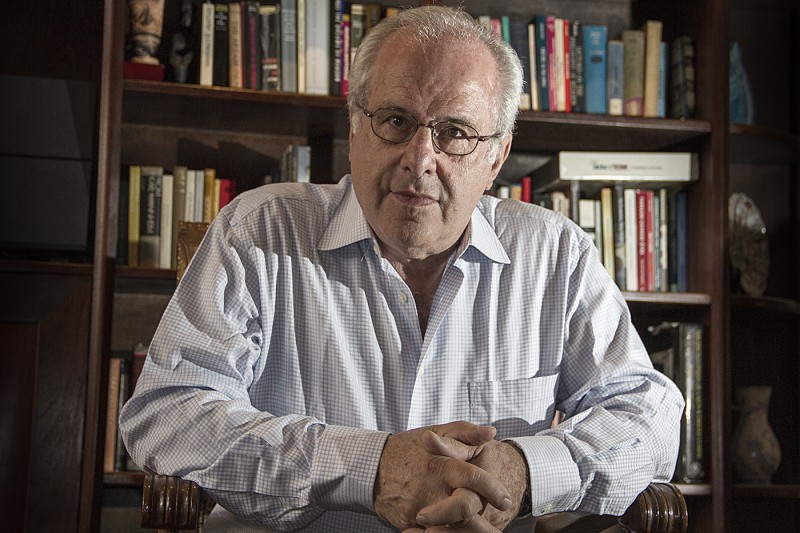Richard Wolff / Economist
“Most adults spend most of their time at work, and there is no democracy at work”
Álvaro Guzmán Bastida New York , 2/05/2016

Richard Wolff
Shane KnightEn CTXT podemos mantener nuestra radical independencia gracias a que las suscripciones suponen el 70% de los ingresos. No aceptamos “noticias” patrocinadas y apenas tenemos publicidad. Si puedes apoyarnos desde 3 euros mensuales, suscribete aquí
Much like Bernie Sanders, Richard Wolff (1942) has spent his entire adult life saying (and writing) many of the same things. Until not so long ago, his fierce critique of capitalism, voiced in his radio show Economic Update and articulated in countless papers and books, found little resonance beyond the fringes. And yet, like the Vermont Senator, he has seen a spectacular renewed interest in those ideas lately. When Wolff, a Marxist economist who was trained at Harvard, Yale and Stanford, sat down with CTXT at a coffee shop near his office in Manhattan’s New School for Social Research a couple weeks ago, he was preparing for a trip to Kentucky, where he would give a series of lectures in public and state universities. “I’ve never even been to Kentucky. And they’re paying to have me tell them about the disaster that capitalism is and what we can do to change it!” he joked, pointing to Occupy Wall Street as the force that brought theories like his –and Bernie Sanders’- onto the discussion table. In his idiosyncratic tone –combining the didactic with the forceful – Wolff spoke about the current situation of the American economy, the forces driving global competition, and the intricacies of the solution he proposes in his book Democracy at Work: A Cure for Capitalism (Haymarket Books, 2012), which turns to the Basque Mondragón Corporation for inspiration.
We get the sense that things are going better economically this side of the Atlantic than in Europe, and even most of the world. And yet, you’ve described the economic situation in the U.S. as bleak, and even a disaster. Isn’t there a recovery in the US, with much lower unemployment and steady growth?
You have to understand, it's a little different in Europe because you have different countries. We have different cities and states, but they're the size of your countries. You have Greece; we have Puerto Rico. I wish I could take you to Detroit. I would show you something ... You don't even have that in Europe.
What do you see in Detroit?
You see a third of the city abandoned. Every other house is burnt. Wild dogs are serious social problem in Detroit. Let me say that again— wild dogs. 20, 30 years ago, Detroit was the best example of American capitalism. When the King of Spain or the Prime Minister of Britain visited the United States, the President took him to Detroit to see the car factories, the workers earning high income, which they did, to be members of a strong union, the UAW ... All of that is gone. The UAW barely exists as a union. The population of Detroit in 1970 was 2 million. The population of Detroit today? 700,000. 1.3 out of 2 million people are gone.
What happened?
Ford, General Motors and Chrysler moved. They made more money making cars in Mexico, in Canada and now in China. That's it. 'Fuck you,' they said to the working class. The city of Detroit is bankrupt. I can sit here for the next 3 hours and give you one after another example of the vanishing of the American middle class. Is it true that of the, roughly, 15 million people unemployed, we're now down to 7 or 8? Yes. But more than half of them left the labor force. That is, they're not looking for work anymore.
So the point is—a lower unemployment rate obscures a harsh economic reality for most Americans…
You have rearranged the American economy. Almost all the good jobs - well-paid, with a pension and medical coverage and so forth - have been tremendously reduced. Maybe half gone. Those people have been rehired now as service workers. They're working in a fitness gym, they're working in Amazon, helping to move packages, they are making you a coffee at Starbucks. They have a job, lower pay, no benefits at all, no future, nothing. But they're working. This is not an economic solution. That's why even though we have lower unemployment, our economy doesn't go anywhere. We have no growth, no well-being. We have the growing gap because all of these people were part of families that once had a pretty good income, a kind of American dream - a house, a car, could send their children to college. They can't do it anymore. Young people are not getting married, or having children. How are they ever going to pay back their student loans, they have no idea.
Some would argue much of that is due to increased global competition
You have radically altered, over the last 40 years, the relationship between capital and labor. The basic way you did that was by bringing a vast number of workers into the orbit of Western Capitalism, with the destruction of the Soviet Union and with the change in the political atmosphere in China. China is able to promise, ‘Will deliver to you –German, Spanish, American, Canadian company – a highly trained, highly disciplined labor force. You pay next to nothing.’ India, Brazil, Eastern Europe ... will say the same. Try to think of it as a capitalist for a minute – Suddenly, you have a vast new supply of labor. You turn to the workers who you pay American or Western European wage levels, ‘What do I need these people for? I'm closing the factory in Barcelona, Paris or Cincinnati or Chicago and I'm opening in Shanghai and in Hyderabad and in Sao Paulo.
Some argue that all that is a shift in conditions of living, that the global south and the peripheries are rising, catching up with the West by benefiting from development, creating a reshuffling of wealth from center to periphery... What do you say to that?
It’s wishful thinking to imagine that this is going to be good for the global South. The decision makers are the same ones. They will play off Brazil against India just as they play off the United Sates against China. They will move and they will go wherever suits them ...
So it is a race to the bottom?
Yes, but it’s not some conspiracy. You can see it already in the clothing business. You had an initial rush to China. Now, you can see a significant number of firms leaving China because the wages have been rising 5 or 6% per year for the last few years. So they go into Vietnam or Malaysia. That's their job. Everybody competes. You have that here in this country too. Only here, it's one city against another city, one state against another state. That's one of the reasons we have such an abysmal tax structure that puts all the burden on middle and low income people.
Let’s talk about the way forward you propose on the book - Why do you think cooperatives –or, like you prefer to call them, worker self-directed enterprises, are the solution to our problems?
For me, everything is about the organization of work. In this model, the workers are not just employees. They're also the board of directors for themselves.
Which means they own the fruits of their labor, but also they choose how to operate?
They direct the enterprise. They do in their enterprise what a board of directors does in a corporation. They decide what to produce, they decide how – with what technology, under which conditions – to produce, they decide where to produce and they decide what to do with the profits— with the net revenue. The workers who produce the surplus are the ones who get it and decide what to do with it. There is no capitalist.
They still have to sell it in the market, right?
Only if market is your institution for distribution.
But you don't think markets are the source of the problem?
That's right. I have a more basic problem. The structure of an enterprise is one thing; the mechanism of distributing the products or services is something else. In America, capitalism is defined as free enterprise plus market. Socialism is public enterprise and planning. But Marx never does this. There's nothing Marx about planning. The key question is who produces the surplus and who gets it. In slavery, the slave produces the surplus, the master gets it. In feudalism, the serf produces the surplus and the lord gets it. In capitalism, the employee produces the surplus and the employer gets it. In communism, the workers produce it and they themselves get it. There's the theory. For us, therefore, the institutional embodiment of the theory is an enterprise in which the workers not only produce the surplus, but appropriate it. That distinguishes it immediately from slavery, feudalism and capitalism.
Many progressives these days emphasize the preponderance of the market -how we all ought to become small businesspeople for ourselves, etc. Isn't there too much market these days?
For me, to have leftists angry at markets means something terrible has been lost. They're going backwards. In bourgeois culture, for you not to talk about the horror of exploitation on the job by always talking about markets, I'm very suspicious. You are doing the work of my enemy.
Let's talk about production then. You argue no democracy is complete without democratic economic institutions.
Complete? There is no democracy ... For me, the claim that the Unites States is democratic is absurd.
How so?
Because the place where most adults spend most of their life is at work, and there is no democracy at work. Therefore, what are you talking about? The best you could say is there's a democracy in the way you reside - your home, your neighborhood - because you vote for the people who are mayor or senator or governor. But you don't vote for your employer. Even if you use democracy equals voting -which I don't- then you don't have it where you are most of the time, which is at work.
What do you have instead of a democracy at work?
A dictatorship. It's obvious. The workplace is a fundamentally - not just undemocratic- anti-democratic institution. When you go to work, you cross the door, you are told what to do, you are told how to do it, you are told where to do it. When you're done, you go home and they own what you produced. You have absolutely no say over what happens to it.
How would your model, based on worker self-directed enterprises, be more democratic?
Every important decision would be made by a majority vote. One person, one vote. It's a collective decision. You bring it up, it's discussed and you decide. For example, Are we going to move production from Ohio to China? That's a short conversation because I know the answer, so do you. No. What group of workers is going to destroy their own job, community, and future? It's crazy. I’ll give you another example –When it comes time to distributing the profits, you think a few people would be given tens of millions of dollars while everybody else can't send their kid to college? Not going to happen.
You use Mondragón as an example of this…
Yes. The highest paid cannot get more 8.5 times what the lowest paid get in any of the Mondragón cooperatives. In this country, the ratio of a CEO to the lowest paid in a corporation is 300 to 1 on average. Some as much as 600 to 1. The problem is not how to redistribute the wealth. That's a terrible way of going about it. We're creating conflict and enmity. That’s why those who can evade their taxes. A much smarter approach would be: Don't distribute unequally in the first place.
I guess people who argue for top to bottom involvement and redistribution are worried about scale. How do we make this work for most people quickly, particularly so that coops are not out-competed by firms that offshore jobs for example?
For me, capitalism is a social organization and it presents a social problem. A social problem can only be solved by a social movement. I suppose you could imagine that one by one, little enterprise and medium enterprise and a big enterprise, go through a transition. But my guess is long before that process can reach conclusion, you're going to have a conflict. Capitalists are going to see this as a threat. How are they going to pay workers very little and executives a great deal if across the street is a coop that doesn't permit that? You will need a political party that is the advocate of worker coops and that the structure becomes the worker coop is the base, which supports it and encourages its growth. By the way, that just replicates how capitalism arose. The early capitalists needed a political movement to rest control from the feudal government of the king. They had to develop struggles for political parties, struggles for parliament. For me, the republicans and democrats are agents of the capitalist system. We will have an agent of our alternative system and will finally have a politics about alternative systems, because we don't have that now.
So those who look at the state as a means to scale things up are wrong in your view.
Having more intervention by the state has nothing to do with changing the system of production ... The Soviet Union represents the state becoming the capitalist. That wasn’t the initial idea, but what they did is they got rid of the private mode of capitalism and substituted it by the state. But they ran it the same way. The worker came to work Monday to Friday, arrive at 8:00, did his work, went home. Somebody else made all the decisions. If the capitalist is a state official, it means you have state capitalism.
What does the Mondragón model mean to you?
I use Mondragón as an example of, one: that you could do this. Number two: that you can solve the problem of going from a small group - Father Arizmendi with 6 people in 1956, to a very large corporation with 80 to 100,000 workers today running its own supermarket chain and all the rest. Number three: Many of the Mondragón cooperatives had, in fact, to compete with capitalist companies in the same line of work. For example, Fagor, which makes refrigerators and washing machines, they had to compete with all kinds of other companies making those kinds of goods. They did very well. Don't tell me that a cooperative cannot compete with a capitalist enterprise.
You also talk about their financing networks, correct?
Yes. The way Mondragón arranges for a certain percentage of the profits of each coop to go into a fund at the Caja Laboral, so that there's start up money for the next coop - that this is a way for the coop movement to be self-financing. That's extremely important. It's a way of collaboration that solves a financial problem for the development and growth of coops. Most of my audiences, they've never heard anything about Mondragón. When I tell them it's the 7th largest corporation in Spain, they don't know what to do with that.
Social movements today don’t seem to emphasize production like you do. Many argue we should put the emphasis on the fact that we work too much, and that we should have more pleasure, more leisure, less work, also for ecological reasons. So how can we create social change by emphasizing production again, when so many of your hypothetical allies see work as something they would like to do less of, rather than a source of identity?
For me, this is an ideological issue. We are all shaped by the society from which we wish to escape. This doesn't go away overnight. It's uninteresting to debate which is more important or which comes first, changing your head or changing your daily life. They all have to change. For example, a worker self-directed enterprise can decide take surplus and use it as leisure. They’re the decision-makers. They have discretion over and we use it for free time so that we can be with our family, so we can do artistic work, so we can sing songs, so we can go for a hike, whatever the hell we want. Or, another one, we don't want to destroy the environment here. We don't want to pollute the river, so we produce less, work less, using our surplus for that.
But that would take some kind of coordination, right? Some sort of political overarching governance.
Of course, there has to be. If you're an enterprise - a factory, an office, a store in the community - the decisions you make as an enterprise impact the community. The political system is going to have to evolve to make the enterprise and the residential community co-determiners. Each has a veto power over the other, otherwise you don't have a true democracy ... Of course the democracy is not limited by the workplace. That could only be possible if the workplace was separated from the community, which it never is. You have that now. The mayor sits down with the corporate leader and they try to work something out. But workers are excluded from that process.
Much like Bernie Sanders, Richard Wolff (1942) has spent his entire adult life saying (and writing) many of the same things. Until not so long ago, his fierce critique of capitalism, voiced in his radio show Economic Update and articulated in countless papers and books, found little resonance beyond the fringes....
Autor >
Álvaro Guzmán Bastida
Nacido en Pamplona en plenos Sanfermines, ha vivido en Barcelona, Londres, Misuri, Carolina del Norte, Macondo, Buenos Aires y, ahora, Nueva York. Dicen que estudió dos másteres, de Periodismo y Política, en Columbia, que trabajó en Al Jazeera, y que tiene los pies planos. Escribe sobre política, economía, cultura y movimientos sociales, pero en realidad, solo le importa el resultado de Osasuna el domingo.
Suscríbete a CTXT
Orgullosas
de llegar tarde
a las últimas noticias
Gracias a tu suscripción podemos ejercer un periodismo público y en libertad.
¿Quieres suscribirte a CTXT por solo 6 euros al mes? Pulsa aquí



